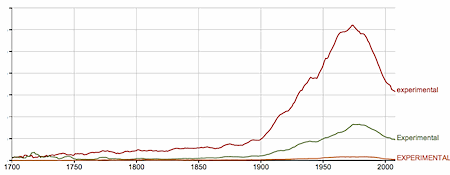
Later this summer Staaltape will release This summer Staaltape released DIKTAT IN AMERICA, a cassette audiozine lovingly compiled, composed & packed by Rinus van Alebeek, documenting DIKTAT's stay in the US of A, almost two years ago, between September 26th and October 3rd of 2012. 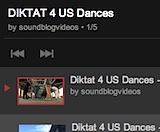 Eligible fans, sponsors and supporters will receive their complimentary copy as soon as it is ready to ship! Hence now and here is about the right time and place for some additional lines on a memorable week spent on the other side of the ocean, as well as for a reassessment of much - if not all - of DIKTAT's art as being, in a broad and basic sense, essentially speculative. Just put in a bit of time and watch the 5 track video album: DIKTAT 4 US Dances, now up on uTube. You will doubtlessly see what I mean....
Eligible fans, sponsors and supporters will receive their complimentary copy as soon as it is ready to ship! Hence now and here is about the right time and place for some additional lines on a memorable week spent on the other side of the ocean, as well as for a reassessment of much - if not all - of DIKTAT's art as being, in a broad and basic sense, essentially speculative. Just put in a bit of time and watch the 5 track video album: DIKTAT 4 US Dances, now up on uTube. You will doubtlessly see what I mean....
Speculative Dancing
Diktat - americana / 2.
july 01, 2014.
"Wáárom?" ... "Dáárom!"
Since Jacques Derrida's disappearance in 2004, much of contemporary philosophy shifted its focus from textual critique towards a reappraisal of the possibility and potential of reasoning that at least some-things are real and exist in-dependent of human minds. A move back towards realism that is not, as the editors of a recent collection of articles on this 'speculative philosophy' are quick to ascertain, 'a move toward the stuffy limitations of common sense, but quite often a turn toward the downright bizarre' ( * ). Current speculative trends in philosophy seem eager to accompany science in its wildest and most far-reaching endeavors, underlining and/or enhancing slogans à la Alain Badiou's mathematics = ontology, underway cracking rusty locks and kicking down some long closed doors to a multitude of worlds that rinkle, tinkle and overflow with magic, secret signs, (w)holey numbers, potions and mysticism, both in theory and in practice.
A lot of it is 'downright bizarre' indeed, in a 'philosophy-as-art' kind of way.

Among the pacesetters of this nouvelle vague is French philosopher Quentin Meillassoux's essay on the necessity of contingency, Après la finitude (After Finitude, 2006), an amusing tour de force in which the author tries to demonstrate - beyond a shadow of a doubt - that, literally without reason, anything can happen at any time, anywhere; even though it never (or shall we - to stay on the safe side - say hardly ever?) does.
"Instead of laughing or smiling at questions like 'Where do we come from, why do we exist?', we should ponder the remarkable fact that the replies 'From nothing, for nothing' really are answers, thereby realizing that these really were questions - and excellent ones at that," Meillassoux insists. "There is no longer a mystery, not because there is no longer a problem, but because there is no longer a reason." ( ** ) It is thus that for Meillassoux the fact that everything is necessarily contingent (i.e. anything that happens does so for no reason at all) stands out as the sole absolute: the one and only necessity is that there is no necessity.

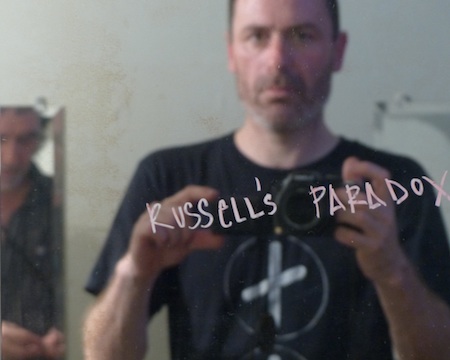
After Finitude is a curious, whence also fascinating, read; not in the least because of the author's apparent insistence to reason about (the reality of) our world within a stubbornly old-school (Newtonian) context of absolute notions of time and space, and bits of 'mathematical' reasoning, (cross) bordering crack pot style, used to justify the fact that we do not seem to experience the hyper-Chaos ("for which nothing is or would seem to be, impossible, not even the unthinkable") that, so Meillasoux does claim, is the only necessity underlying our cosmos: there is nothing, really, that could prevent me from turning right here and now into a breathing miniature purple Brontosaur, and then on into a brand new winged Ford Model T, before once again re-materializing as a copy of my former self... Ours - or maybe better: Meillassoux's - is "a world with no physics, but only a chronics of things"... I am pretty sure though that none of you would put your money on the chance of actually witnessing any of these transformations, no more than on the chance that the third track on Mr. Bowie's 'Young Americans' album will turn out to be a song called Speculation the next time that you hear it...
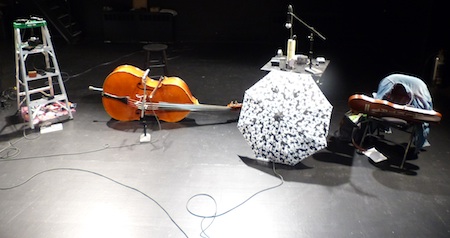
...
All well and good, but what's this got to do with DIKTAT?
...

...
It's the speculative, is what it's got to do with DIKTAT...
...

Speculative of course is not a novel term. The word derives from the Latin specere (to see) and speculum (mirror). As an adjective it has been used since the late 14th century. But the intriguing & very rich history of its semantics will take one back at least as far as the dawn of our cultures. As a musical category, speculative music links the art-science of music to ritual, magic, mathematics, numerology, astrology, cosmology, kabbalah, alchemy, and what else do you have. It refers to the concept of our music as a cosmos and our cosmos as a music ('the music of the spheres'). However, when as off the late 17th century some pretty solid walls began to be erected between science-that-works and mystimagical abracadabra-that-you-have-to-believe, speculative music sort of went underground, where its purveyors joined time travellers, alchemists, astrologists, Kabbalists and other seers of signs and doers of magic.

The British/American musicologist Joscelyn Godwin spent much of his life exploring and documenting the speculative tradition in music throughout the ages. I highly recommended that you at least once leaf through some of the books that he wrote on the subject, like The Harmony of the Spheres: The Pythagorean Tradition in Music (1993), or Music and the Occult: French Musical Philosophies, 1750-1950
(1995). Probably closer to the more specific musical interests of most viewers of this blog is Music, Magic & Mysticism
the fifth volume of Arcana, a series of fine books edited by John Zorn, that collect writings, reflections and insights of contemporary musicians on the process of the making of (their) music. Though as far as I remember the term does not occur explicitly on any of this volume's four and a half hundred pages, speculative music is what all of it is about.
Before this turns into a sketch for what could easily become a whole series of theses and to make a long story shorter: the upshot is that as a matter of fact the bulk of 20th century avant-garde, modernist, post-modernist and post-post-modernist art, should - in a profound sense, and on varying levels - be thought of as being speculative at heart rather than 'Xperimental'. Some of these theses actually have been written already. An exemplary example - also this one highly recommended - is Florian Cramer's study of 'text art' (in German): Exe.cut[up]able statements: Poetische Kalküle und Phantasmen des selbstausführenden Texts (2006, pdf - CC licensed).

Even though speculation is quickly becoming maybe even more of an 'intellectual' buzz term than deconstruction has ever been, and disregarding the risk of possible associations with woolley new age-like practices: as an adjective to music speculation makes a near to perfect fit for an awful lot, if not all, of the more or less contemporary musics that are dear to me, but currently continue to be miss-named as 'experimental music'; which more than anything else is a blatant symptom of the all-pervading scientism that was so typical for much of last century ( *** ). There are of course exceptions. Sometimes art and sometimes music really does experiment. But in its current, ubiquitous use, it is about the worst misnomer that I know...
So I really think we should jump at the occasion. If you have to call that what you do something, why not name it something that is as close as possible to what indeed it is?
Enters DIKTAT, as a case in point...
The four fine concerts that we did during our 2012 stay in the US - at Muhlenberg College's Recital Hall in Allentown PA on September 27th, at Jeff Zeromoon's vibrant Sonic Circuits Festival in the Atlas Performing Arts Center in Washington DC on September 28th, at the Panoply Performance Laboratory in Brooklyn NY on October 1st and at the Incubator Arts Project on the second floor of St. Mark's Church-in-the-Bowery in the East Village on October 2nd - of course were as important as they were fun to do. But this time the concerts again were also a pretext, that enabled us to add a number of US items to what de facto is DIKTAT's principal raison d'être: our series of un-public sonic rituals in public space and their recorded documentation.
Five of the clips of DIKTAT's American hors concert interventions now have been collected, with little or no cuts or edits, just the way they were captured by Rébus's camera, in a 5 track uTube playlist called DIKTAT 4 US Dances. The total playing time is about forty minutes. A veritable speculative music video album.
The five tracks follow below, in chronological order, each with a short contextual description. I will resist the temptation to also add contentual comments, and just let sounds and image speak for themselves.
Bethlehem, PA

After our performative lecture in Doug Ovens's electronic music class on the morning of Thurday September 27th (2012, that is) and before our evening concert (both were at Muhlenberg College in Allentown PA), our host Scott Sherk brought us to Bethlehem, a city a little east of Allentown. Between 1857 and 2003 Bethlehem was home to the Bethlehem Steel Corporation, long time America's second largest steel producer and largest shipbuilder. We performed on the vast and totally empty top floor of what used to be the Bethlehem Steel electric repair shop on Third Street, site of a proposed National Museum of Industrial History. That project, however, does not seem to be making lots of progress.

Bethesda, MD
On Friday September 28th we drove south, to Washington DC, where that evening we did our concert at the Sonic Circuits Festival. We stayed in the Marriott Suites on Democracy Boulevard in Bethesda MD, some 30 kilometers north-east of the center of town. The morning after, on Saturday September 29th, DIKTAT danced on top of the Bethesda Marriott's parking...
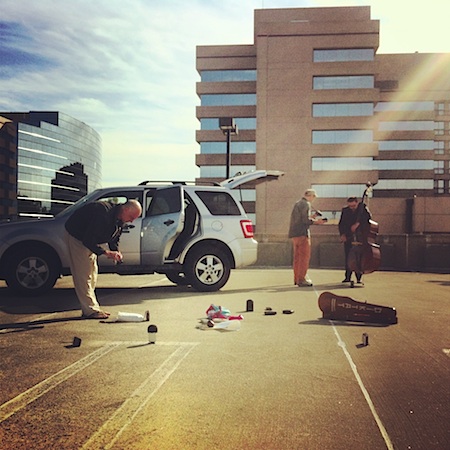
Washington D.C.
You can read the juicy details of our sonic circumscriptions a bit later that same Saturday in front of the former Watergate Hotel in Audio Monitoring the Watergate Hotel. Here is the video.
It is of definite interest to hear and view this clip alongside the slightly edited version of what was captured - as a double stereo file - by the digital Zoom recorder that all that time remained an immutable focal point of our actions.
Williamsburg, Brooklyn NY
On Monday October 1st we went back up to New York, where we stayed and played in the sweet Panoply Performance Laboratory on Meserole Street in Brooklyn's Williamsburg area. It was the first day of the week-long Jewish Sukkot. This accounted for the great many amazing sukkah constructions that we saw all around the morning after the concert, on Tuesday October 2nd, when we set out to explore the Hasidic part of Williamsburg.
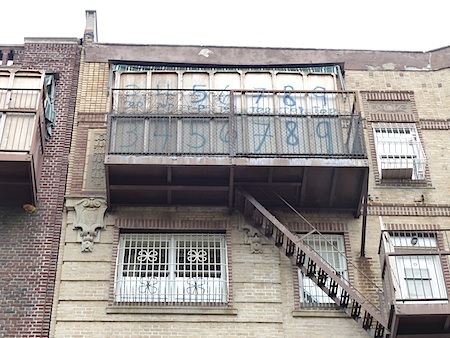
We did our own sort of sonic ritual celebration on the corner of Keap Street and Williamsburg Street, where we settled on the small triangular shaped Rabbi Joel Teitelbaum Place.
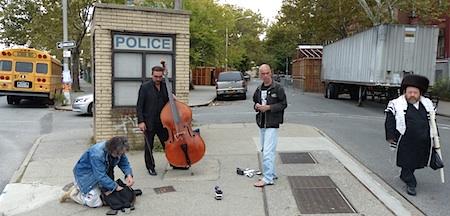
I recorded chunks of our walk that morning on the Tamashi WD100 dictaphone that I had bought at a Paris garage sale just before our US trip. The recordings on this very cheap cassette made-in-China-machine turned out splendidly lo-fi, making everything, including the wonderful Hasidic singing that drifted into the Williamsburg streets from inside some of the houses that we passed, sound as if one were listening with one's ears firmly stuffed with wax. The track below, Sukkah, was built from these recordings. The fragments of text spoken in Yiddish that start after approximately 3 minutes come from a bit of discarded cassette tape that I found just minutes after DIKTAT's celebratory sonic speculation on the Rabbi Joel Teitelbaum Place, stuck in the fence lining the crossing of Lee Avenue and the Brooklyn Queens Expressway.
Williamsburg Bridge, NY
After our performance on Tuesday evening October 2nd at the Incubator Arts Project on the second floor of St. Mark's Church-in-the-Bowery in the Manhattan East Village (which, I am sad to learn, will close its doors this very month), we walked back to Brooklyn. It had us cross the Williamsburg Bridge in the early morning of Wednesday October 3rd.
We stopped halfway...
"... [L]a terre n'est pas sauvée seulement, elle entre bientôt en Harmonie; la lune disparaît et notre planète est enrichie de 5 satellites, en 1953 ..."
Victor Hennequin
Religion. Tome I (1854)

Thanks once again to our American hosts and friends: Jeff 'Zeromoon' Surak (Sonic Circuits), Daniel Barbiero (for lending Jean his double bass), Scott Sherk & Doug Ovens (Muhlenberg College), Valerie Kuehne (Panoply), Travis Just (Incubator)... Without you, there would not have been a US Diktatour.
- to be continued -
notes __ ::
(*) Levi Bryant, Nick Srnicek & Graham Harman (eds.) - The Speculative Turn: Continental Materialism and Realism. re.press Melbourne, 2011 (open access book, pdf)
..... [
^ ]
(**) Quentin Meillassoux - After Finitude: An Essay on the Necessity of Contingency Translated from the French by Ray Brassier, Bloomsbury Academic (2010); chapter 4 [
^ ]
(***) Cf. my forthcoming article on 'speculation' and 'speculative music' for the (Dutch) magazine Gonzo (Circus): De Grote Vibrator, to appear in #122, July/August 2014. [
^ ]
tags: Diktat, USA, speculative music, dictaphone, cassette
# .453.
comments for Speculative Dancing ::
|
Comments are disabled |
Read about Diktat elsewhere:
Gonzo #175, mei/juni 2023 - Een Band zonder Eigenschappen
Read about Diktat on the SoundBlog:
(2023, december 23) - Diktat rules in Brussels
(2023, august 20) - Three days of residency at Les Ateliers Claus, Brussels
(2018, august 13) - Rage, rafts & refugees
(2014, july 01) - Speculative Dancing - Diktat - americana / 2
(2012, october 20) - Audio monitoring the Watergate Hotel - Diktat - americana / 1
(2012, august 11) - Diktat outside/inside the Manufactured Normalcy Field
(2012, february 19) - Magnetic Remanence
(2011, August 05) - (I can't get no) Immediate Satisfaction - Diktat in Berlin [iii]
(2011, Juli 31) - 'Komm raussi!' - Diktat in Berlin [ii]
(2011, Juli 29) - 'Where ist Ausland?' - Diktat in Berlin [i]
(2010, march 30) - on-g'luk = un-luck, that is: malheur, twice ...
(2009, april 16) - Le Grande Cirque
(2009, february 10) - DIKTAT's "Sturm der Liebe"
(2007, october 19) - Diktat in Breda [ii. boezem]
(2007, october 14) - Diktat in Breda [i. dutch angle]
(2007, september 20) - Diktat in Den Haag
(2006, april 7) - The birth of Diktat
Listen to Diktat:
(2016) - Tour de Force (Coherent States, CS-7)
(2012) - DIKTAT in Berlin
See & hear Diktat:
(2014) - 4 US Dances
